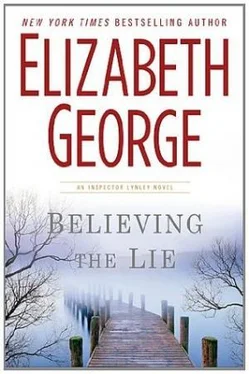Ian wondered about this, however, just as he wondered about debts to be paid and to whom such payment needed to go. It was one other thing on his mind this evening. It was one other thing that kept him out on the water.
The lake was not a lonely place. Because of its size — the largest body of water in Cumbria — a few small towns and villages sprang up intermittently on its shores, and in scattered areas within the rest of the undeveloped landscape the occasional slate-fronted house stood, either a country home long ago converted into a high-priced hotel or a private domicile that usually spoke of a well-heeled individual with the funds to live in more than one place because as autumn gave way to winter, the lakes became unwelcoming to those who weren’t prepared for heavy wind and snow.
Thus, Ian felt no sense of isolation out on the water. True, he was the only one rowing at the moment, but there was comfort along the shore where boats used by members of a local club and boats, kayaks, canoes, and sculls belonging to inhabitants of the lakeside houses had not yet been removed from the water for the coming winter.
He couldn’t have said how long he rowed. It couldn’t have been long, he thought, as it didn’t seem as if he’d gained much distance. He’d not yet come upon the Beech Hill Hotel, from which he’d be able to see clearly the hulk of Belle Isle lying low in the water. That usually marked the halfway point of his workout, but he realised he must have been more exhausted than he thought from his discussion with Kaveh because he found his muscles were growing weary, telling him it was time for turning back.
He sat for a moment, still, unmoving. He could hear traffic noises from the A592, which ran along the east shore of the lake. But aside from the rain hitting the water and against his windcheater, that was it. Birds were abed, and everyone of sense was indoors.
Ian breathed deeply. A shiver shuddered through him, someone walking on his grave, he thought wryly. Either that or the weather, which was far more likely. Even in the rain, he caught the scent of wood smoke from a chimney nearby and in his mind he pictured a warming blaze, himself in front of it with his legs stretched out, and next to him Kaveh. In a similar chair, holding in his hand a similar glass of wine, taking part in a desultory end-of-day conversation of the kind millions of couples had in millions of homes all over the planet.
That, he told himself, was what he wanted. That and the peace that came with it. It didn’t seem so much to ask: just a life moving forward as other lives did.
Some minutes passed in this way: with limited sounds, Ian at rest, the scull moving gently with the rhythm of the water. Had it not been raining, he might even have dozed. But as it was, he was becoming progressively wetter and it was time to head back to the boathouse.
He reckoned he’d been on the water for more than an hour, and it was in complete darkness that he made his final approach to the shore. By this time, trees were mere shapes on the land: angular conifers as solid as standing stones, wispier birches line-drawn against the sky and among them maples with palmate leaves trembling as the rain beat upon them. A path among them led down to the boathouse, a fanciful structure when seen from the water, for even now despite the weather and the hour, the shape of it formed a mass of crenellation, slate, and limestone and its weatherside doorway rose in a gothic arch more suitable to a church than to a shelter for boats.
The light had burned out above this doorway, Ian saw. It should have come on with the fall of darkness, illuminating the exterior of the boathouse even if it did little enough to shed light on the building’s insides. But where a yellow glow would have — at least in better weather — attracted moths, there was nothing at all. Along with the algae on the jetty steps, it was something else to be seen to.
He aimed for the arched opening and glided within. The boathouse was nowhere near the main house, nor was it near the tower folly, so there was nothing — no hint of distant light — to break the gloom, and the darkness was absolute. There were three other craft stored there. A well-used fishing rowingboat, a speedboat, and a canoe of uncertain vintage and even more uncertain seaworthiness were tied up haphazardly along the front and the right side of the dock. It was necessary to work one’s way among them to get back to the far end where the scull had been tied, and Ian was able to do this by feel, although he caught his hand between the rowingboat and the scull and he swore as the fiberglass of one smashed his knuckles into the wood of the other.
The same thing happened against the stone dock, and he felt the blood this time. He said, “God damn ,” and pressed his knuckles against his side for a moment. The damn things hurt like the dickens and told him that whatever else he did, he needed to do it with care.
There was a torch in his car, and he had enough sense of humour remaining to congratulate himself for having left it there where it would do him absolutely no bloody good. More carefully this time, he reached out for the dock, found it, and then sought the cleat to tie up the scull. At least, he thought, he could make a cleat hitch in light or in dark, in rain or in shine. He did so and released his feet from the stretchers. Then he shifted his weight and reached for the dock to heave himself up and out of the shell.
As these things do, it happened when the balance of his weight was on a single stone of the dock and his body was momentarily arched out of the scull and over the water. The stone that should have taken his weight — and now apparently too long in place on the dock to do so — became dislodged. He fell forward, and the scull — tied only at its bow — shot backwards. Down he went into the frigid water.
On his way, however, his head slammed into the slate from which the dock had long ago been fashioned. He was unconscious when he hit the water, and within a few minutes he was also dead.
Their arrangement was the same as it had been from the first. She would communicate in some way, and he would go to her. Sometimes it was a quarter smile, just an upturn of her lips gone so quickly that anyone unaware of what it meant would not even have noticed. Sometimes it was the word tonight murmured as they passed in a corridor. At other times she said something openly if, perhaps, they met on the stairway or in the officers’ mess or if, perhaps, they saw each other in the underground car park arriving by chance at the same moment in the morning. But in any case, he waited until she gave the word. He didn’t like it this way, but there was no other. She would not under any circumstances come to him, and even had she been willing to do so, she was his superior officer so he was hers to command. It did not work the other way round.
He’d tried it only once, early on in their arrangement. He’d thought it might mean something if she spent the night with him in Belgravia, as if their relationship had turned some sort of corner, although he wasn’t exactly certain that he wanted it to do so. She’d said firmly in that way she had of making things so pellucid there were no further avenues of discussion available to him, That will never happen, Thomas. And the fact she called him Thomas rather than the more intimate Tommy by which his every friend and colleague referred to him said more than the other, larger truth that he knew she would not say: The house in Eton Terrace was still redolent of his murdered wife, and eight months after her death on the front steps of the building, he hadn’t been able to bring himself to do a single thing about that. He was insightful enough to realise that there was little likelihood of any woman’s sleeping in his bed while Helen’s clothes still hung in the wardrobe, while Helen’s scent bottles still stood on the dressing table where Helen’s hairbrush still held strands of Helen’s hair. Until Helen’s presence was eradicated from the house, he could not realistically hope to share it with anyone else, even for a night. So he was caught, and when Isabelle said that word — Tonight? — he went to her, drawn by a force that was at once a physical need and a form of oblivion, however brief.
Читать дальше












